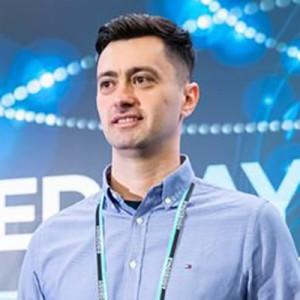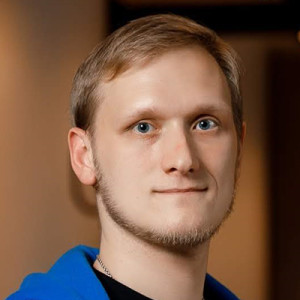Joker 2019 review: planet parade, or what awaits us
Any event, especially if it has ended, can be compared with something unusual. For example, he was at a meeting, and he turned out to be a gathering of witches to exchange wisdom, or, say, ran to a party - as if he had fallen in a downpour with a thunderstorm. And at the end of the month on October 25-26, Joker 2019 will be held in St. Petersburg, nothing has happened yet, but for myself I compare this conference with a parade of planets.
The parade of planets is not such a frequent astronomical phenomenon that you can afford to miss it. Next, I will try to tell you what planets await us and why you need to rush to get on this racing train. Under the cut, there are many links to previous reports and a block review of the program.

The first planet, traditionally the focus of the Joker conference, is the VM / runtime talk block. This block is traditionally a lot of incendiary.
 As a listener, I am always struck by the ability of the JUG Ru Group to get cool speakers from abroad. And I want to start with Remi Forax , he will give a lecture on “ The sinuous path toward Valhalla ”. A lot of bytecode, the insides of the VM components, blood, guts, dismembered - everything we love.
As a listener, I am always struck by the ability of the JUG Ru Group to get cool speakers from abroad. And I want to start with Remi Forax , he will give a lecture on “ The sinuous path toward Valhalla ”. A lot of bytecode, the insides of the VM components, blood, guts, dismembered - everything we love.
Despite the fact that Remi works at a small university in the suburbs of Paris, he pretty much managed to participate in the life of the Java community: he is one of the fathers of invokedynamic introduces in Java 7, helped create the specifications lambdas (Java 8), modules (Java 9) and constant dynamic (Java 11). Currently participating in the Amber and Valhalla projects, according to some experts, it is in these projects that the most interesting thing in the Java world is happening now.
You can get acquainted in advance with the manner of the Remi narration from 2015 and 2017, respectively:
 And while we are talking about the Valhalla project, it’s impossible to go past Sergey Kuksenko Walrus , he will make a report - “ Do Java need inline types? Performance Engineer's Narrow Look at Valhalla Project »
And while we are talking about the Valhalla project, it’s impossible to go past Sergey Kuksenko Walrus , he will make a report - “ Do Java need inline types? Performance Engineer's Narrow Look at Valhalla Project »
Sergey works in Oracle, and in August we published on Habr a large interview with him - “ Thousands of things that in Java would be worth fixing from the first version ”
Of course, Sergei as a speaker has been familiar to many for a very long time. And those whom he interested only now may attack the following reports:
 In general, the Joker 2019 program committee could not get past the new products in Java, and Dan Heidinga , the leading OpenJ9 architect and member of the JSR 292 (invokedynamic) expert group, is one of those who should be listened to. The title of his report is “ Condy? NestMates? Constable? Understanding JDK 11 & 12's JVM features ”- speaks for itself. An IBM employee, a Canadian and just a great speaker with a beautiful and clear pronunciation, leads a twitter , in which, in addition to foreign JVM experts, our compatriots flash: Alexei Shipilev, Ivan Krylov, Roman Elizarov, etc. The amount of useful information on Twitter Dan Heidinga rolls over.
In general, the Joker 2019 program committee could not get past the new products in Java, and Dan Heidinga , the leading OpenJ9 architect and member of the JSR 292 (invokedynamic) expert group, is one of those who should be listened to. The title of his report is “ Condy? NestMates? Constable? Understanding JDK 11 & 12's JVM features ”- speaks for itself. An IBM employee, a Canadian and just a great speaker with a beautiful and clear pronunciation, leads a twitter , in which, in addition to foreign JVM experts, our compatriots flash: Alexei Shipilev, Ivan Krylov, Roman Elizarov, etc. The amount of useful information on Twitter Dan Heidinga rolls over.
 And imagine, you want a real hardcore. You already know a lot about compilers, are familiar with the basics of graph theory, the bytecode code execution model, Java code loading and unloading, and the rudiments of code generation. And now you want to dive deeper into the JIT HotSpot “C2”, then you definitely need to get to the Cliff Click performance “ The Sea of Nodes and the HotSpot JIT ”
And imagine, you want a real hardcore. You already know a lot about compilers, are familiar with the basics of graph theory, the bytecode code execution model, Java code loading and unloading, and the rudiments of code generation. And now you want to dive deeper into the JIT HotSpot “C2”, then you definitely need to get to the Cliff Click performance “ The Sea of Nodes and the HotSpot JIT ”
For about 15 years, Cliff has worked at HotSpot JVM. He participated in the initial development of the JVM, was one of the creators of the famous HotSpot Server Compiler (C2), improved a significant part of the Azul technology stack and proved to the world that JIT compilation has the right to life. Just Cliff Click is the legend of the Java world.
Cliff's pair of appearances this year:



In the same block, there are a lot of interesting things about other VMs (GraalVM, TornadoVM, TeaVM):
The second planet in the Joker 2019 parade, of course, is the Language talk block. And here for many it's just a gift of fate - the opportunity to meet a person who has opened the door to the Java world for many.
 Cay Horstmann himself will make a presentation - Feature Evolution in Java 13 and Beyond . Kay Horstmann is one of the most famous authors in the Java world and there is a chance that you read one of his books (there is a non-zero probability of getting an autograph, bring books with you), from the latter you may be interested in:
Cay Horstmann himself will make a presentation - Feature Evolution in Java 13 and Beyond . Kay Horstmann is one of the most famous authors in the Java world and there is a chance that you read one of his books (there is a non-zero probability of getting an autograph, bring books with you), from the latter you may be interested in:
You could already see the performance at Joker 2017:
You can’t get past a couple of interviews:
 It seems to many that Java runs forward so fast that projects cannot keep up with it. Oleg Nenashev oleg-nenashev in his report “ War Story: how we implemented Java 11 support in Jenkins ” will talk about what problems he encountered in a real large Maven project when moving, or rather, if he wanted to support Java 11.
It seems to many that Java runs forward so fast that projects cannot keep up with it. Oleg Nenashev oleg-nenashev in his report “ War Story: how we implemented Java 11 support in Jenkins ” will talk about what problems he encountered in a real large Maven project when moving, or rather, if he wanted to support Java 11.
Oleg is a developer at CloudBees, is a member of the core team of the Jenkins project. For many, it will be useful to look at the reports of different years from Oleg devoted to Jenkins:
 We know Tagir Valeev lany as the developer of JetBrains, he is engaged in the IntelliJ IDEA static code analyzer, inspections and quick fixes. And as a person who literally feels the changes in Java at his fingertips, Tagir will give a lecture “ Java 9-14: Small optimizations ”. Unbeknownst to you, Java is getting a little faster here or there every day, this work is ongoing in the standard library. In this talk, Tagir will talk about small performance improvements in the most basic and ubiquitous classes like String, ArrayList, HashSet, which were implemented after the release of Java 8 and make our life better.
We know Tagir Valeev lany as the developer of JetBrains, he is engaged in the IntelliJ IDEA static code analyzer, inspections and quick fixes. And as a person who literally feels the changes in Java at his fingertips, Tagir will give a lecture “ Java 9-14: Small optimizations ”. Unbeknownst to you, Java is getting a little faster here or there every day, this work is ongoing in the standard library. In this talk, Tagir will talk about small performance improvements in the most basic and ubiquitous classes like String, ArrayList, HashSet, which were implemented after the release of Java 8 and make our life better.
Tagir's previous reports:
And just a couple of interviews:



In this block you cannot ignore the following reports:
 The third planet Tooling cannot take place without the employees of JetBrains, the main forge of code-tools in the world.
The third planet Tooling cannot take place without the employees of JetBrains, the main forge of code-tools in the world.
Nikita Koval ndkoval , one of the members of the Kotlin team, will give a lecture “ Testing multithreaded algorithms using Lincheck ”. Nikita in his report will talk about the Lincheck tool, which helps in testing and debugging multi-threaded code, affects the API and the internal device. Considering that debugging multi-threaded code is not the easiest task, mastering a new tool will not be superfluous.
Nikita has performed many times, and sometimes it is worth revising something from the recent past:
 Well, where to go in this section of Tooling without Developer Advocate, this time Sebastian Daschner will give a presentation - “ Striving towards more productive development workflows ”. A live coding session awaits us on the stage, but we love it and cannot live without it. Sebastian talks about the approaches and technologies that support teams in developing more productive development workflows. In addition, there is something hypnotic in Sebastian's speeches, you yourself can see this by watching one of his last speeches:
Well, where to go in this section of Tooling without Developer Advocate, this time Sebastian Daschner will give a presentation - “ Striving towards more productive development workflows ”. A live coding session awaits us on the stage, but we love it and cannot live without it. Sebastian talks about the approaches and technologies that support teams in developing more productive development workflows. In addition, there is something hypnotic in Sebastian's speeches, you yourself can see this by watching one of his last speeches:
And Sebastian Daschner maintains an absolutely wonderful blog, for example, in September, he launched a series of six posts - “ Thoughts on efficient enterprise testing ”
 And if we talked about testing, then it is impossible to get past the Testcontainers library. It allows you to quickly and cross-platform run from your JUnit (and not only) tests Docker containers with popular databases, Selenium browsers and in general everything that can run in Docker. With the ability to run both locally during development, and on CI-servers without changes, and this is important. Sergey Egorov bsideup from Pivotal will just give a report “ Testcontainers: a year later ”
And if we talked about testing, then it is impossible to get past the Testcontainers library. It allows you to quickly and cross-platform run from your JUnit (and not only) tests Docker containers with popular databases, Selenium browsers and in general everything that can run in Docker. With the ability to run both locally during development, and on CI-servers without changes, and this is important. Sergey Egorov bsideup from Pivotal will just give a report “ Testcontainers: a year later ”
To be in the subject, just look at a number of previous reports by Sergey:
 While everyone is urging you to be effective and automate your routine, Yuri Artamonov jreznot from JetBrains will give a presentation entitled “ Crash Course on IntelliJ IDEA Plugin DevKit ”. After his speech, you will exclaim “Enough to endure this!” And file your own plugin. In the report, Yuri will tell you how to quickly understand Plugin DevKit and write something useful without dying under the load of new knowledge.
While everyone is urging you to be effective and automate your routine, Yuri Artamonov jreznot from JetBrains will give a presentation entitled “ Crash Course on IntelliJ IDEA Plugin DevKit ”. After his speech, you will exclaim “Enough to endure this!” And file your own plugin. In the report, Yuri will tell you how to quickly understand Plugin DevKit and write something useful without dying under the load of new knowledge.
It may be useful to watch some of Yuri’s early speeches:
No Java conference can pass by such a stellar phenomenon as Spring, especially if it is represented by Josh Long , Juergen Hoeller and Mark Heckler . All from the previously mentioned Pivotal company.


Using Spring and not knowing who Holler and Long are is probably strange, because they do not need to be introduced. First, they will hold a joint opening report, “ Reactive Spring revisited, ” in which they expect a live coding session on Spring Framework 5.2 using Spring Boot 2.2, it will be especially useful to see how one of the founders of the Spring Framework and, perhaps, the main Spring Developer Advocate in the world should look like the creation of a new generation of reactive microservices for cloud architectures.
And secondly, each of them has a solo report:
Jürgen’s report focuses on the core tools for optimized application architectures in modern Java-enabled deployment environments, as well as Kotlin as the basis for higher-level features in Spring Data and Spring Boot. At the same time, Josh’s talk teaches you how to test Spring Boot applications. Both reports are for practicing engineers.
What does Josh have, that Jurgen always has something to see and to learn:
 Mark Heckler will give a lecture “ Spring Security for N00bz: A quick introduction for the terminally insecure ”. On the one hand, a simple report on Spring Security, and on the other, this is the part of our work that the vast majority of developers do not even think about. Spring Security provides a proven application security platform. It integrates with multiple languages and components for end-to-end security. If you are not familiar with Spring Security, it's time to pull up your knowledge in this area.
Mark Heckler will give a lecture “ Spring Security for N00bz: A quick introduction for the terminally insecure ”. On the one hand, a simple report on Spring Security, and on the other, this is the part of our work that the vast majority of developers do not even think about. Spring Security provides a proven application security platform. It integrates with multiple languages and components for end-to-end security. If you are not familiar with Spring Security, it's time to pull up your knowledge in this area.
Here are a couple of Mark's reports for warming up:
In addition to Spring, there are three more reports on Reactive in this section, and I will tell you only about one, but which one! If you were at the spring conference of JPoint 2019, then you could not pass by the performance of Evgeny Borisov and Kirill Tolkachev tolkkv . The duo's report became the third in popularity . And with the same title, but with completely different content, the report - “ Reactive or not reactive: that’s the question ” - will hit the audience on the morning of the second day of the conference.

 Colleagues will consider an example of a system in which there are problems. I’ll try to refactor the system in a reactive style. The report will consider the advantages and disadvantages of not only the approach, but also the API of specific implementations. And most importantly, they will help to figure out what is toys and what is not.
Colleagues will consider an example of a system in which there are problems. I’ll try to refactor the system in a reactive style. The report will consider the advantages and disadvantages of not only the approach, but also the API of specific implementations. And most importantly, they will help to figure out what is toys and what is not.
The “Reactive or non-reactive: that's the question” report is one of those reports that I expect with my fingers crossed with the words “If only, at least.” And if you are not convinced, I recommend taking a look at some of the previous reports, for example, “Boot yourself, Spring is coming” (in two parts: one , two ).
So as not to get up twice twice, I’ll tell you about the two-day training of the previously mentioned duet. Evgeny Borisov and Kirill Tolkachev on October 27 and 28, immediately after the conference, will conduct a twin training “ Spring Boot Mastering + Spring Cloud Mastering ”.
If you want to really understand:
then Spring Boot Mastering is for you.
As a result, you will seriously increase your understanding of how to write microservices, and the second part of Spring Cloud Mastering will allow you to delve into issues related to microservice architecture, since microservices come with new opportunities, but also new problems, the responsibility to solve which does not go anywhere. We need to be able to correctly circumvent them, which also allows us to Spring Cloud (of course, not all). If you want to understand what problems will await you when switching to a microservice architecture, so promoted by Spring Cloud, to be able to deal with them, and just keep abreast of this dynamically developing stack, then Spring Cloud Mastering is for you.
On the other side of the conference, and more precisely before its start, on October 23rd and 24th, there will be a training entitled “ Effective profiling of Java applications ”, the author and host of which is Alexei Ragozin . Alexey has more than 10 years of experience in the development of highly loaded distributed systems in various industries, an active speaker at Russian and foreign software conferences and an open source contributor.
Under the leadership of Alexei, you will receive key knowledge and skills for the effective use of the profiler in your work. I think many people understand that facing a task that requires the use of a profiler is not the most common case. For this reason, many developers usually do not have the opportunity to learn how to effectively own this tool from their own experience. Alexey transfers his experience and knowledge in the framework of the training, and in a critical situation this can dramatically reduce the time to solve the problem.
And now, it would seem, the main planets are covered, but among the participants there can be real undisclosed stars who have something to say. And they have time and place for this. On the first day, October 25, starting at 20:30, mini-presentations will be held during the party. Every ten minutes a speaker enters the stage with slides, and this is his finest hour. If you are one of these, and you have something to say, feel free to send an application - you still have time.
If you have doubted all this time whether to go to Joker 2019, then I hope I managed to convince you. Come and share the good mood with 2000 Joker conference participants who have already purchased a ticket and are looking forward to real Java hardcore. There is still the opportunity to purchase tickets , hurry to jump into the last carriage.
The parade of planets is not such a frequent astronomical phenomenon that you can afford to miss it. Next, I will try to tell you what planets await us and why you need to rush to get on this racing train. Under the cut, there are many links to previous reports and a block review of the program.

VM / runtime
The first planet, traditionally the focus of the Joker conference, is the VM / runtime talk block. This block is traditionally a lot of incendiary.
 As a listener, I am always struck by the ability of the JUG Ru Group to get cool speakers from abroad. And I want to start with Remi Forax , he will give a lecture on “ The sinuous path toward Valhalla ”. A lot of bytecode, the insides of the VM components, blood, guts, dismembered - everything we love.
As a listener, I am always struck by the ability of the JUG Ru Group to get cool speakers from abroad. And I want to start with Remi Forax , he will give a lecture on “ The sinuous path toward Valhalla ”. A lot of bytecode, the insides of the VM components, blood, guts, dismembered - everything we love.
Despite the fact that Remi works at a small university in the suburbs of Paris, he pretty much managed to participate in the life of the Java community: he is one of the fathers of invokedynamic introduces in Java 7, helped create the specifications lambdas (Java 8), modules (Java 9) and constant dynamic (Java 11). Currently participating in the Amber and Valhalla projects, according to some experts, it is in these projects that the most interesting thing in the Java world is happening now.
You can get acquainted in advance with the manner of the Remi narration from 2015 and 2017, respectively:
- Design Pattern Reloaded
- Project Amber (French, subtitles rule)
 And while we are talking about the Valhalla project, it’s impossible to go past Sergey Kuksenko Walrus , he will make a report - “ Do Java need inline types? Performance Engineer's Narrow Look at Valhalla Project »
And while we are talking about the Valhalla project, it’s impossible to go past Sergey Kuksenko Walrus , he will make a report - “ Do Java need inline types? Performance Engineer's Narrow Look at Valhalla Project »
Sergey works in Oracle, and in August we published on Habr a large interview with him - “ Thousands of things that in Java would be worth fixing from the first version ”
Of course, Sergei as a speaker has been familiar to many for a very long time. And those whom he interested only now may attack the following reports:
- Alexei Shipilev and Sergey Kuksenko - Optimizing the performance of Java applications: theory (2012)
- Sergey Kuksenko and Alexei Shipilev - Through thorns to lambdas, part 1 , part 2 (2012)
- Sergey Kuksenko - “Quantum” Performance Effects (2013)
- Sergey Kuksenko - Stream API part 1 , part 2 (2014)
- Sergey Kuksenko - Iron meters on guard of productivity (2015)
- Sergey Kuksenko - A Tale of How One HTTP / 2 Client Engineer Overclocked (2017)
 In general, the Joker 2019 program committee could not get past the new products in Java, and Dan Heidinga , the leading OpenJ9 architect and member of the JSR 292 (invokedynamic) expert group, is one of those who should be listened to. The title of his report is “ Condy? NestMates? Constable? Understanding JDK 11 & 12's JVM features ”- speaks for itself. An IBM employee, a Canadian and just a great speaker with a beautiful and clear pronunciation, leads a twitter , in which, in addition to foreign JVM experts, our compatriots flash: Alexei Shipilev, Ivan Krylov, Roman Elizarov, etc. The amount of useful information on Twitter Dan Heidinga rolls over.
In general, the Joker 2019 program committee could not get past the new products in Java, and Dan Heidinga , the leading OpenJ9 architect and member of the JSR 292 (invokedynamic) expert group, is one of those who should be listened to. The title of his report is “ Condy? NestMates? Constable? Understanding JDK 11 & 12's JVM features ”- speaks for itself. An IBM employee, a Canadian and just a great speaker with a beautiful and clear pronunciation, leads a twitter , in which, in addition to foreign JVM experts, our compatriots flash: Alexei Shipilev, Ivan Krylov, Roman Elizarov, etc. The amount of useful information on Twitter Dan Heidinga rolls over.
- Dan Heidinga, Paul Sandoz - CONSTANT_Dynamic: oxymoron or powerful new tool?
- Dan Heidinga - Migrate Early, Migrate Often! JDK Release Cadence Strategies
- Devoxx US 2017: Create high performance runtimes with Eclipse OMR
 And imagine, you want a real hardcore. You already know a lot about compilers, are familiar with the basics of graph theory, the bytecode code execution model, Java code loading and unloading, and the rudiments of code generation. And now you want to dive deeper into the JIT HotSpot “C2”, then you definitely need to get to the Cliff Click performance “ The Sea of Nodes and the HotSpot JIT ”
And imagine, you want a real hardcore. You already know a lot about compilers, are familiar with the basics of graph theory, the bytecode code execution model, Java code loading and unloading, and the rudiments of code generation. And now you want to dive deeper into the JIT HotSpot “C2”, then you definitely need to get to the Cliff Click performance “ The Sea of Nodes and the HotSpot JIT ”
For about 15 years, Cliff has worked at HotSpot JVM. He participated in the initial development of the JVM, was one of the creators of the famous HotSpot Server Compiler (C2), improved a significant part of the Azul technology stack and proved to the world that JIT compilation has the right to life. Just Cliff Click is the legend of the Java world.
Cliff's pair of appearances this year:



In the same block, there are a lot of interesting things about other VMs (GraalVM, TornadoVM, TeaVM):
- Ionut Balosin - A race of two compilers: GraalVM JIT versus HotSpot JIT C2. Which one offers better runtime performance?
- Juan Fumero - TornadoVM: A Virtual Machine for Exploiting High-Performance Heterogeneous Hardware of Java Programs
- Alexey Andreev - TeaVM: the difficulties of translating from Java to JavaScript
Language
The second planet in the Joker 2019 parade, of course, is the Language talk block. And here for many it's just a gift of fate - the opportunity to meet a person who has opened the door to the Java world for many.
 Cay Horstmann himself will make a presentation - Feature Evolution in Java 13 and Beyond . Kay Horstmann is one of the most famous authors in the Java world and there is a chance that you read one of his books (there is a non-zero probability of getting an autograph, bring books with you), from the latter you may be interested in:
Cay Horstmann himself will make a presentation - Feature Evolution in Java 13 and Beyond . Kay Horstmann is one of the most famous authors in the Java world and there is a chance that you read one of his books (there is a non-zero probability of getting an autograph, bring books with you), from the latter you may be interested in:
- Core Java (11th Edition) Part 1 , Part 2
- Core Java SE 9 for the Impatient
You could already see the performance at Joker 2017:
You can’t get past a couple of interviews:
- “Working on Projects That Combine Book and Interactive”: Kay Horstmann on Books and More
- How to Become a Better Java Developer
 It seems to many that Java runs forward so fast that projects cannot keep up with it. Oleg Nenashev oleg-nenashev in his report “ War Story: how we implemented Java 11 support in Jenkins ” will talk about what problems he encountered in a real large Maven project when moving, or rather, if he wanted to support Java 11.
It seems to many that Java runs forward so fast that projects cannot keep up with it. Oleg Nenashev oleg-nenashev in his report “ War Story: how we implemented Java 11 support in Jenkins ” will talk about what problems he encountered in a real large Maven project when moving, or rather, if he wanted to support Java 11.
Oleg is a developer at CloudBees, is a member of the core team of the Jenkins project. For many, it will be useful to look at the reports of different years from Oleg devoted to Jenkins:
- Meeting with Oleg Nenashev - Groovy DSL at Jenkins and Pipeline Part 1 , Part 2
- SPB Jenkins Meetup # 12. Oleg Nenashev, A Brief Review of Jenkins X
- Oleg Nenashev - Managing Security at Jenkins
 We know Tagir Valeev lany as the developer of JetBrains, he is engaged in the IntelliJ IDEA static code analyzer, inspections and quick fixes. And as a person who literally feels the changes in Java at his fingertips, Tagir will give a lecture “ Java 9-14: Small optimizations ”. Unbeknownst to you, Java is getting a little faster here or there every day, this work is ongoing in the standard library. In this talk, Tagir will talk about small performance improvements in the most basic and ubiquitous classes like String, ArrayList, HashSet, which were implemented after the release of Java 8 and make our life better.
We know Tagir Valeev lany as the developer of JetBrains, he is engaged in the IntelliJ IDEA static code analyzer, inspections and quick fixes. And as a person who literally feels the changes in Java at his fingertips, Tagir will give a lecture “ Java 9-14: Small optimizations ”. Unbeknownst to you, Java is getting a little faster here or there every day, this work is ongoing in the standard library. In this talk, Tagir will talk about small performance improvements in the most basic and ubiquitous classes like String, ArrayList, HashSet, which were implemented after the release of Java 8 and make our life better.
Tagir's previous reports:
- Tagir Valeev - Stream API: recommendations of the best dog breeders
- Tagir Valeev - Pattern matching and his imaginary friends
- Tagir Valeev - Amber Project: News from the Fields
- Tagir Valeev - Atomic refactoring in IntelliJ IDEA: we bend the IDE for ourselves
And just a couple of interviews:
- “When you work on code inspections, you meet Java jigsaw puzzles every day”: Tagir Valeev about working on IntelliJ IDEA
- “I learned something - try to explain it until you understand it yourself”



In this block you cannot ignore the following reports:
- Simon Ritter - Keeping Up With Java: Look At All These New Features!
- Roberto Cortez - GraalVM and MicroProfile: A Polyglot Microservices Solution
- Jacek Kunicki - ScalaTest: you're asserting it wrong
Tooling
 The third planet Tooling cannot take place without the employees of JetBrains, the main forge of code-tools in the world.
The third planet Tooling cannot take place without the employees of JetBrains, the main forge of code-tools in the world.
Nikita Koval ndkoval , one of the members of the Kotlin team, will give a lecture “ Testing multithreaded algorithms using Lincheck ”. Nikita in his report will talk about the Lincheck tool, which helps in testing and debugging multi-threaded code, affects the API and the internal device. Considering that debugging multi-threaded code is not the easiest task, mastering a new tool will not be superfluous.
Nikita has performed many times, and sometimes it is worth revising something from the recent past:
- Nikita Koval - Testing lock-free algorithms, or Search for a needle in a haystack (2017)
- Nikita Koval - How to Find a Deadlock Without Hitting It (2017)
- Nikita Koval - How the channels in the coroutines are arranged in Kotlin (2018)
- Nikita Koval - Hardware Transactional Memory in Java (2018)
- Nikita Koval - Towards a Fast Multithreaded Hash Table (2018)
- Nikita Koval - Tale of how we did the channel algorithm in Kotlin Coroutines (2019)
 Well, where to go in this section of Tooling without Developer Advocate, this time Sebastian Daschner will give a presentation - “ Striving towards more productive development workflows ”. A live coding session awaits us on the stage, but we love it and cannot live without it. Sebastian talks about the approaches and technologies that support teams in developing more productive development workflows. In addition, there is something hypnotic in Sebastian's speeches, you yourself can see this by watching one of his last speeches:
Well, where to go in this section of Tooling without Developer Advocate, this time Sebastian Daschner will give a presentation - “ Striving towards more productive development workflows ”. A live coding session awaits us on the stage, but we love it and cannot live without it. Sebastian talks about the approaches and technologies that support teams in developing more productive development workflows. In addition, there is something hypnotic in Sebastian's speeches, you yourself can see this by watching one of his last speeches:
- Sebastian Daschner - Cloud native Java EE (2017)
- Sebastian Daschner - Create effective tests or create excuses - testing the Java EE way (2018)
- Sebastian Daschner - Cloud native, service-meshed Java Enterprise with Istio (2019)
- Sebastian Daschner - 7 Principles of Productive Software Developers (2019)
And Sebastian Daschner maintains an absolutely wonderful blog, for example, in September, he launched a series of six posts - “ Thoughts on efficient enterprise testing ”
 And if we talked about testing, then it is impossible to get past the Testcontainers library. It allows you to quickly and cross-platform run from your JUnit (and not only) tests Docker containers with popular databases, Selenium browsers and in general everything that can run in Docker. With the ability to run both locally during development, and on CI-servers without changes, and this is important. Sergey Egorov bsideup from Pivotal will just give a report “ Testcontainers: a year later ”
And if we talked about testing, then it is impossible to get past the Testcontainers library. It allows you to quickly and cross-platform run from your JUnit (and not only) tests Docker containers with popular databases, Selenium browsers and in general everything that can run in Docker. With the ability to run both locally during development, and on CI-servers without changes, and this is important. Sergey Egorov bsideup from Pivotal will just give a report “ Testcontainers: a year later ”
To be in the subject, just look at a number of previous reports by Sergey:
- Sergey Egorov - TestContainers: Docker Docker Docker ... and tests (2017)
- Sergey Egorov - TestContainers - integration testing with Docker (2017)
- Sergey Egorov - Don't Be a Homer Simpson for Your Reactor! (2019)
 While everyone is urging you to be effective and automate your routine, Yuri Artamonov jreznot from JetBrains will give a presentation entitled “ Crash Course on IntelliJ IDEA Plugin DevKit ”. After his speech, you will exclaim “Enough to endure this!” And file your own plugin. In the report, Yuri will tell you how to quickly understand Plugin DevKit and write something useful without dying under the load of new knowledge.
While everyone is urging you to be effective and automate your routine, Yuri Artamonov jreznot from JetBrains will give a presentation entitled “ Crash Course on IntelliJ IDEA Plugin DevKit ”. After his speech, you will exclaim “Enough to endure this!” And file your own plugin. In the report, Yuri will tell you how to quickly understand Plugin DevKit and write something useful without dying under the load of new knowledge.
It may be useful to watch some of Yuri’s early speeches:
- Yuri Artamonov - Jlink and Custom Runtime Image - Frankenstein workshop (2018)
- Yuri Artamonov - I want a strange one - web UI in Java for desktop applications (2018)
- Yuri Artamonov - Anatomy and Physiology of Vaadin Flow (2019)
Spring and Reactive
No Java conference can pass by such a stellar phenomenon as Spring, especially if it is represented by Josh Long , Juergen Hoeller and Mark Heckler . All from the previously mentioned Pivotal company.


Using Spring and not knowing who Holler and Long are is probably strange, because they do not need to be introduced. First, they will hold a joint opening report, “ Reactive Spring revisited, ” in which they expect a live coding session on Spring Framework 5.2 using Spring Boot 2.2, it will be especially useful to see how one of the founders of the Spring Framework and, perhaps, the main Spring Developer Advocate in the world should look like the creation of a new generation of reactive microservices for cloud architectures.
And secondly, each of them has a solo report:
Jürgen’s report focuses on the core tools for optimized application architectures in modern Java-enabled deployment environments, as well as Kotlin as the basis for higher-level features in Spring Data and Spring Boot. At the same time, Josh’s talk teaches you how to test Spring Boot applications. Both reports are for practicing engineers.
What does Josh have, that Jurgen always has something to see and to learn:
- Josh Long - Reactive Spring (2018)
- Juergen Hoeller - 15 Years of Spring: Evolving a Java Application Framework (2018)
- Juergen Hoeller - Current and Future State of Java (2018)
- Juergen Hoeller - Spring Framework 5 1 on JDK 8 & 11 (2018)
- Josh Long - Bootiful TDD (2019)
- Josh Long - Reactive Streams (2019)
 Mark Heckler will give a lecture “ Spring Security for N00bz: A quick introduction for the terminally insecure ”. On the one hand, a simple report on Spring Security, and on the other, this is the part of our work that the vast majority of developers do not even think about. Spring Security provides a proven application security platform. It integrates with multiple languages and components for end-to-end security. If you are not familiar with Spring Security, it's time to pull up your knowledge in this area.
Mark Heckler will give a lecture “ Spring Security for N00bz: A quick introduction for the terminally insecure ”. On the one hand, a simple report on Spring Security, and on the other, this is the part of our work that the vast majority of developers do not even think about. Spring Security provides a proven application security platform. It integrates with multiple languages and components for end-to-end security. If you are not familiar with Spring Security, it's time to pull up your knowledge in this area.
Here are a couple of Mark's reports for warming up:
- Mark Heckler - Full-stack Reactive Java with Project Reactor & Spring Boot 2
- Mark Heckler - Drinking from the Stream: How to Use Messaging Platforms for Scalability & Performance
In addition to Spring, there are three more reports on Reactive in this section, and I will tell you only about one, but which one! If you were at the spring conference of JPoint 2019, then you could not pass by the performance of Evgeny Borisov and Kirill Tolkachev tolkkv . The duo's report became the third in popularity . And with the same title, but with completely different content, the report - “ Reactive or not reactive: that’s the question ” - will hit the audience on the morning of the second day of the conference.

 Colleagues will consider an example of a system in which there are problems. I’ll try to refactor the system in a reactive style. The report will consider the advantages and disadvantages of not only the approach, but also the API of specific implementations. And most importantly, they will help to figure out what is toys and what is not.
Colleagues will consider an example of a system in which there are problems. I’ll try to refactor the system in a reactive style. The report will consider the advantages and disadvantages of not only the approach, but also the API of specific implementations. And most importantly, they will help to figure out what is toys and what is not.
The “Reactive or non-reactive: that's the question” report is one of those reports that I expect with my fingers crossed with the words “If only, at least.” And if you are not convinced, I recommend taking a look at some of the previous reports, for example, “Boot yourself, Spring is coming” (in two parts: one , two ).
Trainings
So as not to get up twice twice, I’ll tell you about the two-day training of the previously mentioned duet. Evgeny Borisov and Kirill Tolkachev on October 27 and 28, immediately after the conference, will conduct a twin training “ Spring Boot Mastering + Spring Cloud Mastering ”.
If you want to really understand:
- what exactly does Spring Boot do when you write microservices;
- how to customize everything;
- how to solve problems of asynchronous requests so that Tomcat does not run out of threads;
- how to break microservice into modules;
- write tests;
- build a model without inheritance so as not to have problems with deserialization later;
then Spring Boot Mastering is for you.
As a result, you will seriously increase your understanding of how to write microservices, and the second part of Spring Cloud Mastering will allow you to delve into issues related to microservice architecture, since microservices come with new opportunities, but also new problems, the responsibility to solve which does not go anywhere. We need to be able to correctly circumvent them, which also allows us to Spring Cloud (of course, not all). If you want to understand what problems will await you when switching to a microservice architecture, so promoted by Spring Cloud, to be able to deal with them, and just keep abreast of this dynamically developing stack, then Spring Cloud Mastering is for you.
On the other side of the conference, and more precisely before its start, on October 23rd and 24th, there will be a training entitled “ Effective profiling of Java applications ”, the author and host of which is Alexei Ragozin . Alexey has more than 10 years of experience in the development of highly loaded distributed systems in various industries, an active speaker at Russian and foreign software conferences and an open source contributor.
Under the leadership of Alexei, you will receive key knowledge and skills for the effective use of the profiler in your work. I think many people understand that facing a task that requires the use of a profiler is not the most common case. For this reason, many developers usually do not have the opportunity to learn how to effectively own this tool from their own experience. Alexey transfers his experience and knowledge in the framework of the training, and in a critical situation this can dramatically reduce the time to solve the problem.
Starfall
And now, it would seem, the main planets are covered, but among the participants there can be real undisclosed stars who have something to say. And they have time and place for this. On the first day, October 25, starting at 20:30, mini-presentations will be held during the party. Every ten minutes a speaker enters the stage with slides, and this is his finest hour. If you are one of these, and you have something to say, feel free to send an application - you still have time.
If you have doubted all this time whether to go to Joker 2019, then I hope I managed to convince you. Come and share the good mood with 2000 Joker conference participants who have already purchased a ticket and are looking forward to real Java hardcore. There is still the opportunity to purchase tickets , hurry to jump into the last carriage.
All Articles